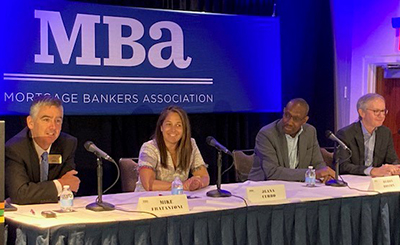
MBASecondary23: As Fed, Banks Step Away from MBS, New Investors Prepare to Play

(l.-r.: Mike Fratantoni, Jeana Curro, Byron L. Boston, Steven Abrahams)
NEW YORK–The supply of available mortgage-backed securities for purchase in the private market is expected to increase drastically over the next two years.
Panelists here at the Mortgage Bankers Association’s National Secondary Market Conference & Expo said this increase stems from a combination of factors, largely due to the Federal Reserve’s monetary tightening policy. They described how this excess supply could be absorbed, how these record supply levels will impact mortgage rates and the overall economy, and the impact on investors, lenders and borrowers.
“This is an interesting time for us, because up until recently, we’ve always had buyers for mortgage-backed securities, and now, we’re not so sure,” said MBA Chief Economist Mike Fratantoni. “Since 2008, the Federal Reserve has been the biggest holder of mortgage-backed securities in the world. But they’re in run-off mode right now.”
“Last year was pretty significant for the money manager community,” said Jeana Curro, Managing Director and Head of Agency MBS Research with BofA Securities, New York. “We’ve seen the Fed reduce their holdings and banks have pulled back as well. Now is a very interesting time, and we’ve seen a significant widening of Treasury spreads, so we see a lot of opportunity for the private market.
Byron L. Boston, President, CEO and Co-Chief Investment Officer of Dynex Capital, Glen Allen, Va., has traded in MBS since 1986. “One of the most misunderstood elements of the mortgage market is that the system only works if there are long-term holders of risk,” he said. “The 30-year loan is the backbone of the housing industry; it’s a great asset…what happens to the future of MBS depends on the level of risk and the ability of skilled managers to manage that risk.”
“When I think about who the buyers have been, I think of it in terms of who was buying before the Global Financial Crisis and who is buying after,” said Steven Abrahams, Managing Director and Head of Investment Strategy with Santander US Capital Markets, New York. “After the GFC, the Fed entered in size and there were policies in place that encouraged banks to hold liquid assets such as mortgage-backed securities. What we’re looking at now is the exit of those players and the return of pricing aimed at making money.”
Abrahams said barring another catastrophic economic event, the market will be dominated by players focused on returns. “The market is really going to be in the hands of private portfolios,” he said.
“There is a huge demand for return, and we now have a market that has the potential for return,” Boston said.
“Supply is going to be a lot less,” Curro said. “The pandemic was this super-interesting opportunity that moved the market up a bit; people moved into bigger homes or they moved to different areas due to remote work. So now, we see a lot less in issuance going forward for a few years.”
Panelists said new sources of investors of MBS are already emerging. “Banks have been reducing their investments in securities because they make more money by making loans than in buying securities,” Abrahams said. “The Fed decision to reduce its portfolio has really changed the market in reallocation of deposits and departure of banks from securitization.”
Banks need more liquidity, Abrahams added. “Regulators are going to be looking at banks with shorter-term assets,” he said. “The SVB closure made that clear. There is pressure from declining advantageous funding and the demand for shorter turnarounds. And regulators love the idea of reserves, which basically means parking cash with the Fed.”
“These are great assets, next to government securities,” Boston said. “At the end of the day, it’s all about price.”
“At some level, it’s about price,” Abrahams agreed. “You may not like the price, but that’s what it’s about.”
“We think that in first quarter of 2024, [Quantitative Tightening] is going to end, and the Fed will move more toward Treasuries,” Curro said.
“And the challenge there is, can the Fed do this without causing too much disruption,” Boston added.
Boston, who runs a real estate investment trust, sees great opportunities for REITs. “We are looking for opportunities to raise capital to deploy cash in these investments,” he said. “There is demand for income, and I believe capital will be formed for this, and returns are very attractive at the current pricing spreads. But capital formation could take some time.”
“Spreads haven’t been this wide in 10 years, and they’re this wide because of the diversity of the buyer base, and REITs were created for this kind of situation,” Abrahams said.
Curro said interestingly, the potential for recession also offers opportunities. “We anticipate demand for safe-haven assets, and Treasuries represent an attractive investment opportunity,” she said.
“It’s a very interesting time, but it’s going to be a fun time,” Curro said.
